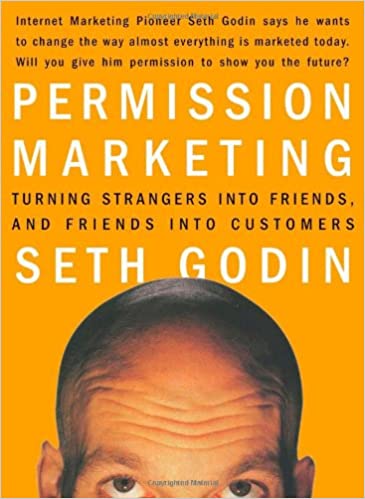
Marketing bookshelf:
Permission Marketing
By Sarah Zane
Marketing guru Seth Godin brings another revolutionary concept to the world of marketing in his bestselling book, Permission Marketing.
In Permission Marketing, Godin claims that traditional marketing is essentially flawed and no longer works. He calls the TV commercial that breaks up a favorite show, the robocall that kills the conversation at the dinner table and the splashy ad that disrupts an article in a magazine “interruption marketing.”
This form of marketing is built on the hope of drawing the consumer’s attention away from whatever it is they were engaged in and prompting it to focus on the marketer’s message. Interruption Marketing is rarely personalized, nor is it relevant to the consumer.
Godin’s alternative approach, “permission marketing,” is built on offering consumers incentives for voluntarily accepting the marketer’s message. The marketer is careful to only reach out to consumers who have expressed an interest in the product or service, and to provide the consumer with relevant, reliable information. Permission Marketing advocates building long-term relationships with consumers through acquired trust and positive communication.
Here are the three primary lessons readers will find inside Permission Marketing:
Lesson 1: Permission marketing is a privilege, not a right.
Traditional marketing uses deliberate interruptions to promote a product and chase down a sale. These interruptions are rarely personalized. By making claims on the consumer’s time without making the interruptions relevant, interruption marketing essentially claims the right to market to the consumer.
Permission marketing, though, is fundamentally different. It recognizes these interruptions as intrusive, annoying and too easy to ignore. Consequently, it asks for permission to market to a consumer. Once permission is granted, it is treated as a privilege. The marketer respects the permission, and the consumer will only receive relevant, personalized messages.
A primary benefit of this approach is the building of anticipation. Interruption marketing only builds annoyance and frustration.
You can easily incorporate this lesson in your credit union by employing content marketing, whose core principle is to provide the consumer with relevant, useful information that subtly promotes your own products.
Lesson 2: Date your customer before proposing
Godin claims that interruption marketing is essentially like a guy walking into a bar and asking a random girl to marry him. If she turns him down, which she almost definitely will, he moves on to the next girl (and the next, and the next, etc.). Interruption marketing works in a similar way: The marketer makes a weak attempt to reach a broad audience in one go. This “Spray and Pray” tactic relies on a small amount of the audience receiving the message in a positive manner and actually saying yes to the “proposal.”
Conversely, permission marketing is more like the conventional manner of dating. The marketer will first ask someone for permission to buy them a drink, then for a date, and then move on to fostering a relationship. After permission is granted for each consecutive step and a relationship is therefore built on trust, a marriage proposal may follow. The approach is more direct, far more personalized and more likely to succeed.
Use this principle to employ targeted marketing for a niche clientele instead of sending a generic message to an enormous audience.
Lesson 3: Great permission comes with great responsibility
In Permission Marketing, Godin talks about the levels of permission granted by a consumer to a marketer. At each ascending level, the consumer grants the marketer more permission and places more trust in them. At the lowest level, “Situation Permission,” the marketer asks the consumer for permission to assist them. At the highest level, “Intravenous Permission,” the marketer is trusted to make purchasing decisions for the consumer.
The marketer’s end goal should be to gain and maintain the complete trust of the consumer. Violating that trust puts the marketer at risk of losing the consumer. The higher the level of permission, the more the marketer stands to lose by violating the trust placed in him by the consumer. For example, if a marketer is at the situation permission level and they provide a consumer with wrong information, the consumer may let it pass. At the intravenous permission level, though, erroneous information might lead the consumer to drop the relationship completely.
As a credit union entrusted with your members’ money, you need to preserve a high level of trust at all times. Curate your marketing so it speaks to your members’ needs and respect the permission they grant you to market to them.
Permission marketing is a more thorough, time-consuming process than traditional interruption marketing. But the returns you can anticipate from personal, relevant messages will make the investment well worth the time and effort you expend.


